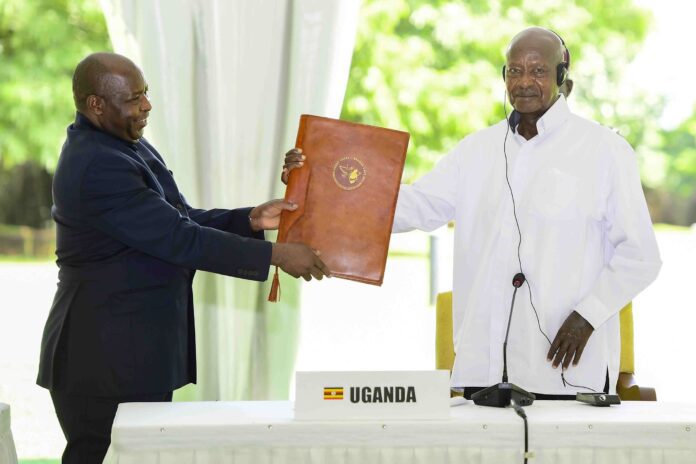President Yoweri Kaguta Museveni has warned foreign actors against interfering in regional conflicts, stating that their involvement often emboldens disruptive forces and undermines homegrown solutions to longstanding crises.
The President made the remarks on Wednesday as he officially assumed the chairmanship of the Regional Oversight Mechanism (ROM) of the Peace, Security, and Cooperation (PSC) Framework for the Democratic Republic of Congo and the Great Lakes Region.
The handover ceremony took place at State House, Entebbe, during the 12th high-level summit of signatory states to the Framework.
President Museveni took over the role from Burundi’s President Évariste Ndayishimiye, who has chaired the mechanism for the past two years.
“We know what the problem is, and it can be solved. But we must have the political will. Foreigners should limit their involvement because they carelessly embolden the mistake,” President Museveni said during his inaugural address as ROM Chair.
“When foreigners support internal groups without understanding the context, it creates the impression that regional actors don’t care. That’s not true. What matters is our regional support,” he added.
The PSC Framework, established in 2013 under the auspices of the United Nations, African Union, International Conference on the Great Lakes Region (ICGLR), and Southern African Development Community (SADC), is a pact aimed at addressing the root causes of instability in eastern DRC through collaborative efforts among regional countries.
In his remarks, President Museveni commended his predecessor for his contribution to the peace process and called for renewed political commitment among regional leaders.
“We now know the problems, and we can solve them. These are not difficult issues. The real challenge lies in three mistakes: philosophy, ideology, and strategy,” he said, referring to historical political missteps that have prolonged regional conflicts.
Museveni also blamed the lingering crisis in eastern DRC on identity-based politics, a problem he said has been exploited by foreign interests since the days of former Congolese leader Mobutu Sese Seko and Rwandan President Juvénal Habyarimana.
“The Mobutu army was defeated in Rwanda, and together with Habyarimana, they fled to Goma. We appealed to Mobutu to disarm them, but he refused. He believed that internal and regional actors didn’t matter—only foreign support did. That mindset is part of the problem,” the President said.
The summit brought together heads of state and government or representatives from PSC Framework signatory countries, including Uganda, Angola, Burundi, Congo-Brazzaville, the Democratic Republic of Congo (DRC), Kenya, Rwanda, South Africa, South Sudan, Sudan, Tanzania, and Zambia.
Also in attendance were representatives of the Guarantor Institutions including the African Union, United Nations, and ICGLR as well as several international partners serving as observers.
The summit concluded with a renewed commitment from member states to enhance regional cooperation, promote dialogue, and reduce foreign interference in domestic affairs, with President Museveni set to lead the mechanism for the next two years.















